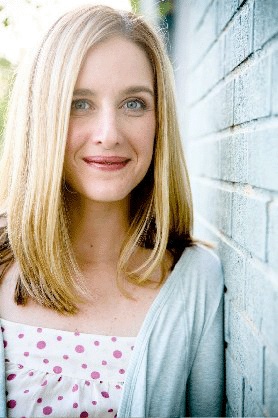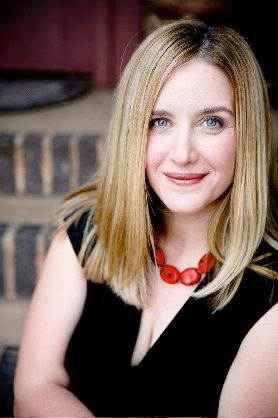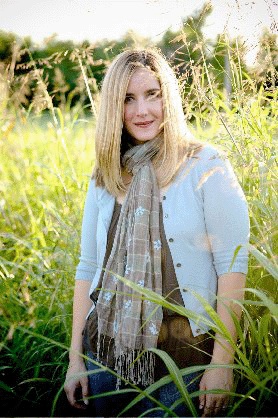KC Clifford
The Orchid Finds the Light
by Richard Cuccaro

special. The singer’s voice came through the ether like mercury — liquid and shining. I was listening to a preview of Orchid, K.C. Clifford’s newest CD (it releases March 2, 2010). The first track, “Broken Things,” offered a glimpse into the wrenching, soul-searing journey she’s taken. “I gave up hopin’ for a guarantee, but love keeps her promise every time you look at me. Somewhere between hell and sheer happiness, there’s a house by the oceanside. And we’ll fill it with dreams and all the broken things that the morning washed in with the tide…”
K.C. Clifford paints her life with every breath. That golden voice, forged, sharpened and honed for its life’s purpose, bears truth, like a mother cradles a newborn.
As a judge, I was thrilled to have a part in bringing K.C. Clifford to the 2009 Falcon Ridge Emerging Artists Showcase, and then again at the Northeast Regional Folk Alliance Conference, voting for her presence in the organized showcases. She made the Tricentrics, and during the conference, I assured her that I would pay homage to her monumental talent. Early last month as she and her husband drove home to Oklahoma City through a snowstorm, we conducted a phone interview. Her cell signal was remarkably clear with only one dropout. Thus, I learned about her amazing journey.
Beginnings
Karen Catherine Clifford was born and raised in Oklahoma City, Oklahoma. K.C.’s dad, Hal, is a bluegrass musician. He founded the band, Mountain Smoke. In addition to performing at the White House and for presidents Gerald Ford, George Bush, Jimmy Carter, and every Oklahoma governor since 1973, another claim to fame was having given country star Vince Gill his start.
There was always music in the house. Because she showed a very early
inclination to perform, the family joke was that K.C. “came out of the womb singing.” She began learning about performing early at a specialized nursery school— Miss Hickman’s Music School. A photograph of her at 2 1/2 years old shows her in a cat costume singing into a microphone. Her parents also enrolled her in dance class and she learned tap, jazz, and ballet; K.C. made every effort to perform as much as she could. She took piano lessons but
didn’t like practicing, so she’d memorize the songs and play them back
without really sight reading.
She wrote her first songs at age 7: “Hats” and “Boys.” K.C. likes to say that it showed an early interest in “accessories “ and “romance.” The lyrics are archived in her old grade school notebook [and could be worth big money someday].
At age 10, she already knew that she wanted to write and record songs for a living. However, someone “influential” [and bone-headed] told her [at age 10!] that she was “too fat” and that “no one would want to look at her” on the cover of an album. This seared her to her core and she felt that “This was not a good dream to have.”
K.C. continued to want to perform, so she joined a children’s theater group in Oklahoma City called “Kandid Kids.” A chorus teacher at her school helped her find a more specialized voice teacher than would be offered at the theater group. So, at age 10, she took classical voice lessons with renowned teacher Don Wilson. By the age of 11 and 12, she’d learned to sing arias in three
languages. Her classical voice training lasted for 10 years.
She also began to successfully compete in classical singing on a national level through the National Association of Teachers of Singing (NATS). She gave up any dream of recording her own songs to accommodate what she thought were the goals other people had for her. All through high school, she performed in musicals and regional theater. She took at least two voice lessons per week and dance training in addition to her regular classes. This meant giving up recreational things such as horseback riding. From the time she was a high school freshman, K.C. had to make adult-level choices.
K.C. had gone to a small private school in Oklahoma City through grade school and high school. There were only 46 students in her graduating class. So, when it was time to go to college, she welcomed entering a bigger arena and being away from her hometown. She considered Julliard in NYC, but chose Indiana University to study opera because it had a highly regarded music conservatory program and she wanted a “real college experience.”
The University of Hard Knocks
Her Teutonic, high-strung voice teacher at Indiana was nothing like the nurturing presence of Don Wilson. Claiming that K.C. was the best in her class and that she just wanted to push her, the teacher engaged in temper tantrums and general emotional abuse. K.C. cried before and after her voice lessons.
The confusion of following a college career that was accomodating to what she thought others wanted for her took its toll. There was no joy in classical singing any more. K.C. had suffered from an eating disorder since childhood, sparked by a family crisis. In the middle of her junior year, she dropped out of school to seek treatment for bulimia. She finally realized that the compliant child in her had caused her to follow an unsuitable path.
As an out-patient from the treatment center, she returned to Indiana to give the classical career one more try before giving up. A different voice teacher was more of a nurturer, so K.C. attempted to register with her. When the last studio slot was taken just before she arrived, K.C. took that as a sign. She figured that she simply wasn’t where she belonged.
A friend who was living in Nashville convinced her to visit there for a few days to take a look around. K.C. arranged for a visit. As it happened, her father, a fund-raising consultant for schools and non-profits, was at a meeting at Belmont University and offered to meet her there for lunch. The meeting ran long, and while she waited, she took a look around and noticed that Belmont had a school of music. At the music school she was browsing through brochures when the dean, passing by, overheard her say that she’d just left Indiana University. Knowing the school’s reputation for excellence, she invited K.C. to sit in her office for a chat, then convinced her to audition for the course in Commercial Singing. This was exactly what K.C. needed.
The “School” of Nashville
It took K.C. three years to graduate. In the process, she began writing songs. Her father bought her a Martin and she learned to play the guitar by applying chords people taught her to her own songs.
Before she left Belmont, she’d started of all things, a punk band called “Built Like Lizzie.” She dyed her hair multiple colors and wrote songs that expressed long-repressed anger over her stifled personal growth. After 2 1/2 years, the band drifted apart and K.C. realized that she’d have to be able to perform solo to continue her career. She started going to open mics and playing small acoustic gigs. She also got studio work singing on demos. K.C.’s healing process -- working through the anger and grief over her lost years -- had given her a calmer persona and both she and her songs were mellower. “I wasn’t as pissed-off,” she says.
K.C. got a break when she landed a job as a nanny for Grammy-award winning songwriter Don Schlitz, who owned his own publishing company and who’d written hits for Kenny Rogers (“The Gambler”), Mary Chapin Carpenter (“I Feel Lucky”) and Randy Travis (“Forever and Ever, Amen”) to name just a few. She watched how he applied himself to the craft of songwriting and absorbed every bit of advice he had to offer. She went to his songwriter circles at the Bluebird Cafe and watched and listened to all the pros ply their craft. “That was so formational for me. I felt like a sponge at the time.”
One piece of advice he gave her should be universal to all singer/songwriters — under any circumstances: “When you go into a co-songwriting session, you check your ego at the door. The song is always the star.” K.C. said that, “I gained a new appreciation for the craft of songwriting. I knew that it would take a long time to grow the skills, to hone the craft to be a good songwriter.”
The Singer Finds Her Own Voice

K.C.’s First CD
K.C. returned to Nashville to begin transitioning out. It happened that the family of PR man, hobbyist musician Larry Williams needed a house-sitter for a week while they were away on vacation. Upon their return, K.C. and the family became very fond of each other and they asked her to stay with them. Larry had his own digital studio in the basement and offered to help her make her first CD, free of charge. So, she dug in and got involved with every aspect of recording her songs. She made it simple, so it would sound the way she’d present herself solo with a guitar to an audience. This became her first CD, Times Like These, and she’s still proud of it. She had finally achieved what she’d dreamed of as a 10-year-old. Despite that early debilitating “advice,” there’s K.C., sitting on a bench in the middle distance, right there on the cover. That golden-throated voice is fully formed and, knowing the path it took, her voice on those songs is enough to break your heart. “It was a symbol of great redemption and victory for me,” she says.
K.C.’s brother had moved to Austin, Texas, and offered to put her up for free, while she got her career on track. In January of 2000, she moved there, but shuttled back and forth to Nashville to finish the CD. This became the start of a peripatetic journey, wherein she booked her own gigs and became a road-weary warrior. She secured a standing $300 gig every other Thursday at Club Indigo in Wichita, Kansas. She’d drive 6 hours from Austin to Oklahoma City to stay at her parents’ house, then drive 2 1/2 hours to Wichita, then drive back to Oklahoma City after the performance. A day or so later, she’d return to Austin.
A New Partner for Life
On one stay-over in Oklahoma City, she attended an open mic 15 minutes from her parents’ home. There, she met her future husband, David Broyles, whose band Dr. Pants was playing that night. David crossed the room to meet her, and they spent that evening getting to know one another, visiting another club afterward. They had their first date two nights later. “That was 10 years ago,” she recalled. “I had just moved to Austin, but my heart was suddenly in Oklahoma. I kept finding more and more excuses to be in Oklahoma, just so I could be with him.” [Today he accompanies her on tour as her backup guitarist.]
In the summer of 2001, she got a lot of gigs in Oklahoma. She became tired, driving from Austin and back and moved back to Oklahoma City. That same year she attended Kerrville and also the Southwest Regional Folk Alliance (SWRFA) Conference. At SWRFA, she met an Australian group, The Bluehouse. They invited K.C. to tour Australia with them. Immediately afterward, the 9/11 attacks took place. It took a month for K.C. to brave getting on a plane to Australia, but in October of 2001, she did a tour with the group. It helped to season her, “The trip of a lifetime,” she says.
In 2002, she and David got engaged and K.C. took a day job as a waitress, wanting to “chill” for a while and plan for the wedding. In 2003, while planning to record a second album and get out on tour again, she got derailed. A booking agent backed out of his agreement with her. Additionally, David’s place of work went out of business. Also, both of her grandmothers passed away within two months, a very upsetting experience for K.C. She’d quit the
waitress job in anticipation of going back on the road. When it fell through, she got another restaurant job. She expected it to last for just a short while, but she was unable to leave it until 2007. Her blog on her website gives some remarkable insights into the rigors of the waiting profession.
The Big Turnaround
K.C.’s life took another turn into a new realm when she began her quest to lose weight. She had spent many years at a weight in excess of 200 pounds. When her weight reached 278 pounds, she knew, “I was just minutes away from 300 pounds and that was totally unacceptable.”
In 2005, wanting to participate in a 5k event, she began running. She actually ran a marathon later, and lost 50 pounds in the training process. However, after the marathon, a sinus infection knocked her back. She stopped running and gained weight again. Then, in 2007, she joined Weight Watchers and in one year, lost 102 pounds. K.C., who, as a little girl, put up walls of flesh to defend herself, began to divest herself of her cocoon.
“Raise Your Voice”

The next link between K.C. and TV’s “The Biggest Loser” then occurred.
General Mills, partnering with “The Biggest Loser,” issued a “Pound for Pound Challenge.” For every pound pledged to an online website, then lost, they’d give a pound of food to Feeding America. The Biggest Loser would be filming press conference segments at food banks around the nation to publicize the challenge. When they chose the Regional Food Bank of Oklahoma City, they were told that a songwriter there had lost 100 pounds and had written a song about hunger. When they came to film the segment, they were so moved by K.C.’s song and story that, in addition to her brief appearance at the press conference, they returned to film a segment exclusively about K.C. (It aired March 10, 2009). In the segment, still viewable on YouTube, K.C. eloquently tells an audience at Oklahoma City University how she lost 100 pounds, then sings “Raise Your Voice.” I challenge anyone to listen to K.C. sing it and not get a lump in his/her throat. “I saw a face today. I could not look away. She could be yours, she could be mine. She couldn’t have been more than eight or nine. She was hungry and poor. She had less, I had more. So raise your voice… together we can change the course if only we will make the choice, so raise your voice.” The song, as well as all her albums are available from her website.
Orchid
When K.C. pondered a name for her newest album she chose Orchid. This flower goes through many changes, in order to be reborn, to reach its mature state of intense beauty. Particular songs are of course, K.C.’s story. Grief, mourning and rebirth are themes throughout the album.
In Jericho, she sings, “…we’re infinitely more than just the sum of all the pain that’s come before… Maybe our walls will come crashing down. Maybe it’s so we can be found. Joining our voices with the sound of redemption.”
Beyond her own grieving, K.C.’s empathy shines in songs like “Redman and “Blue Bonnets.” “Redman” deals with the Native Americans who were forcibly removed from the southeast and relocated to Oklahoma, producing the legend of the “Trail of Tears.” “Don’t know why their promise was a lie,” she sings. In “Blue Bonnets,” a mother’s preparation for the birth of a baby, then
devastation at its loss is heard in the words, “I recall the day I felt you slip away. Before one single breath. Same day your birth and death.”
K.C. acknowledged that her time spent studying classical voice enables her to understand how her vocal instrument works. She refuses to dwell on the elements in her life that caused her so much pain, but keeps the focus on the things within her own power, vowing to “keep things on my side of the street.”
Acoustic Live is in awe of her gifts and hopes that you’ll join us as we cheer her on. We eagerly wait for presenters in our area to add her to their bookings. There is a tentative date for a performance at the Christopher Street Coffeehouse in NYC’s Greenwich Village on Thursday, April 15th. Stay tuned.
website: www.kcclifford.com
Upcoming appearances include:
Mar 5 7pm House Concert - El Paso, Texas
6 7pm Solid Grounds Coffeehouse - Albuquerque, New Mexico
11 The Poet’s Loft - Hot Springs, Arkansas

